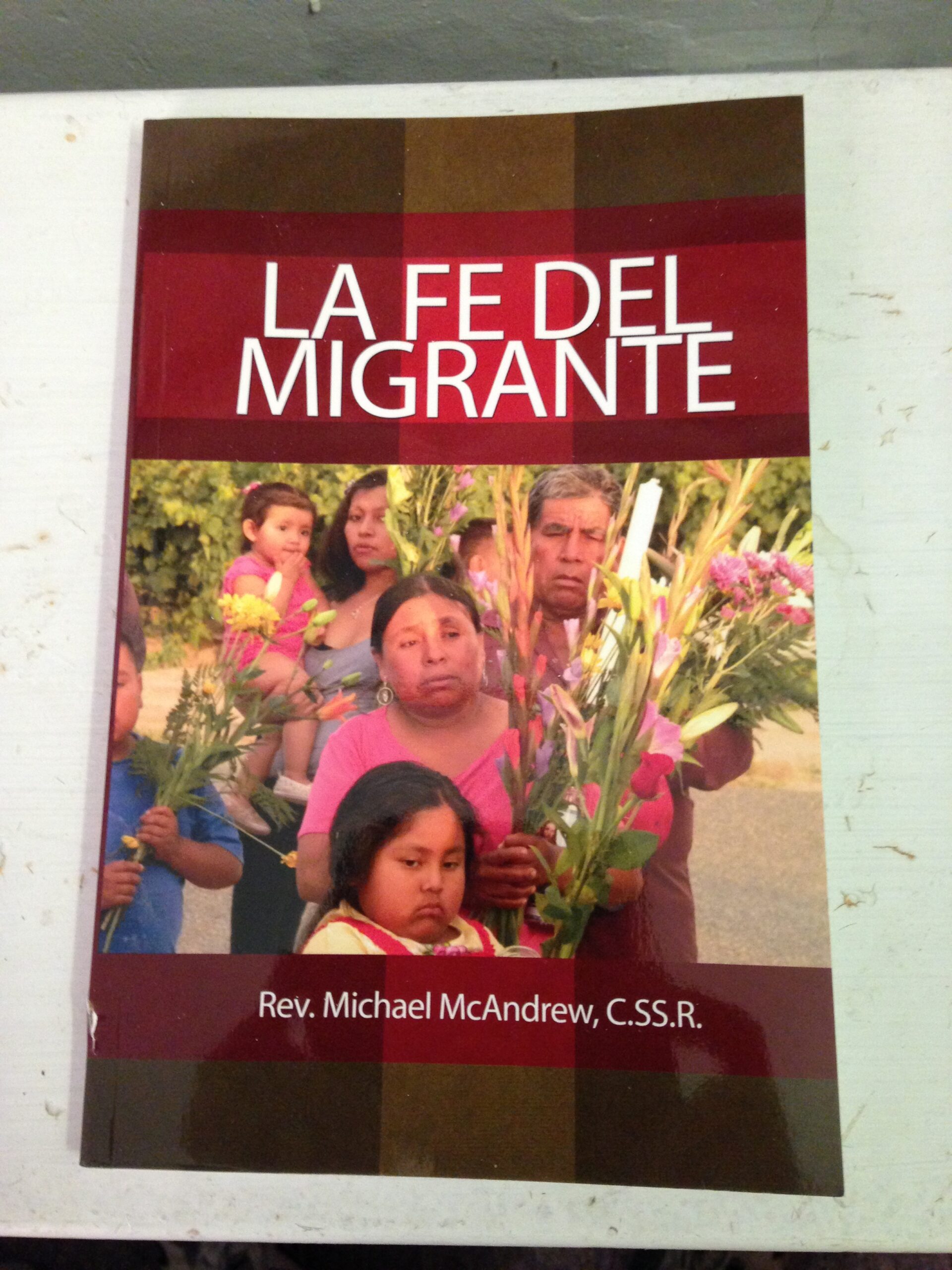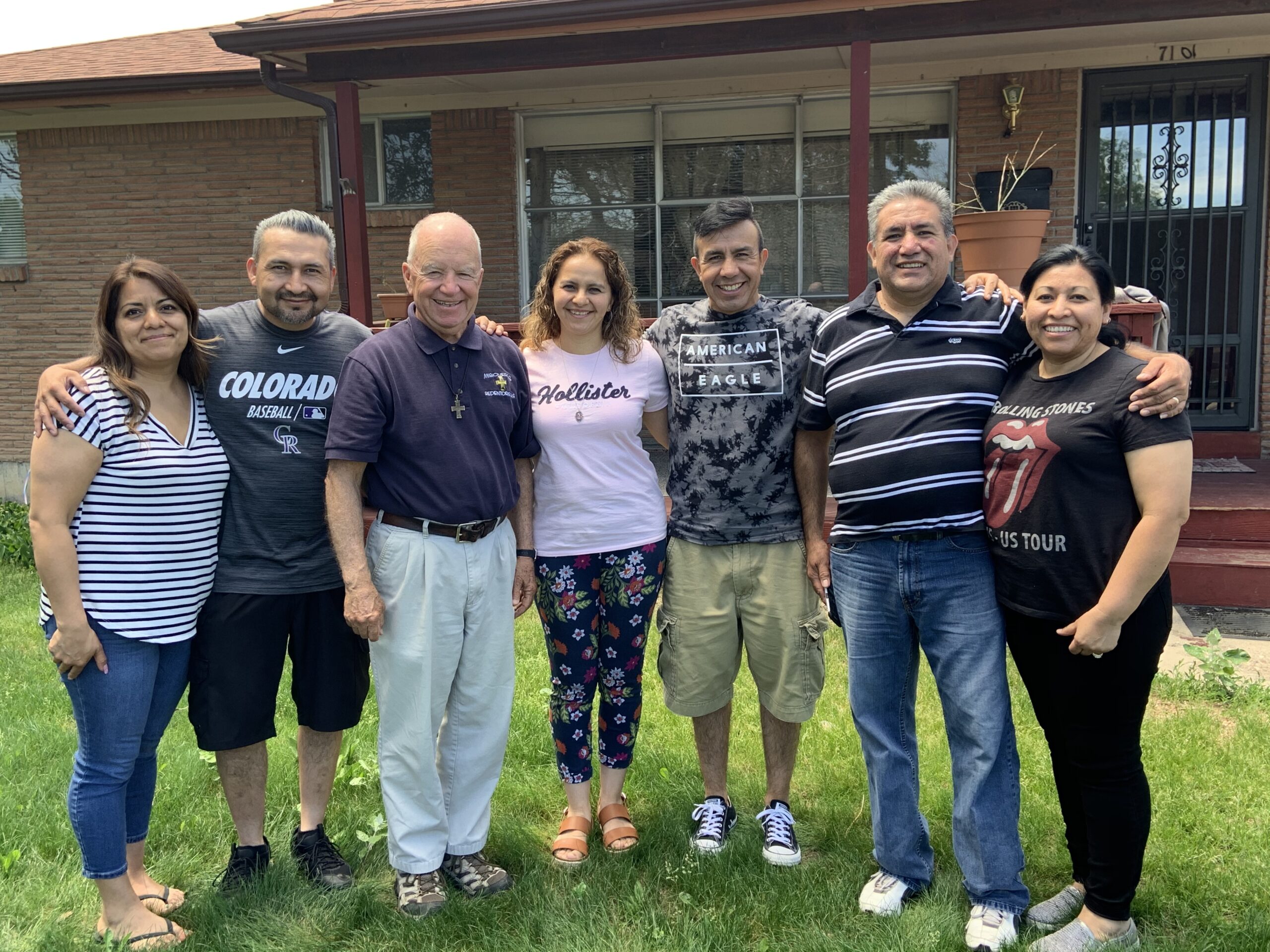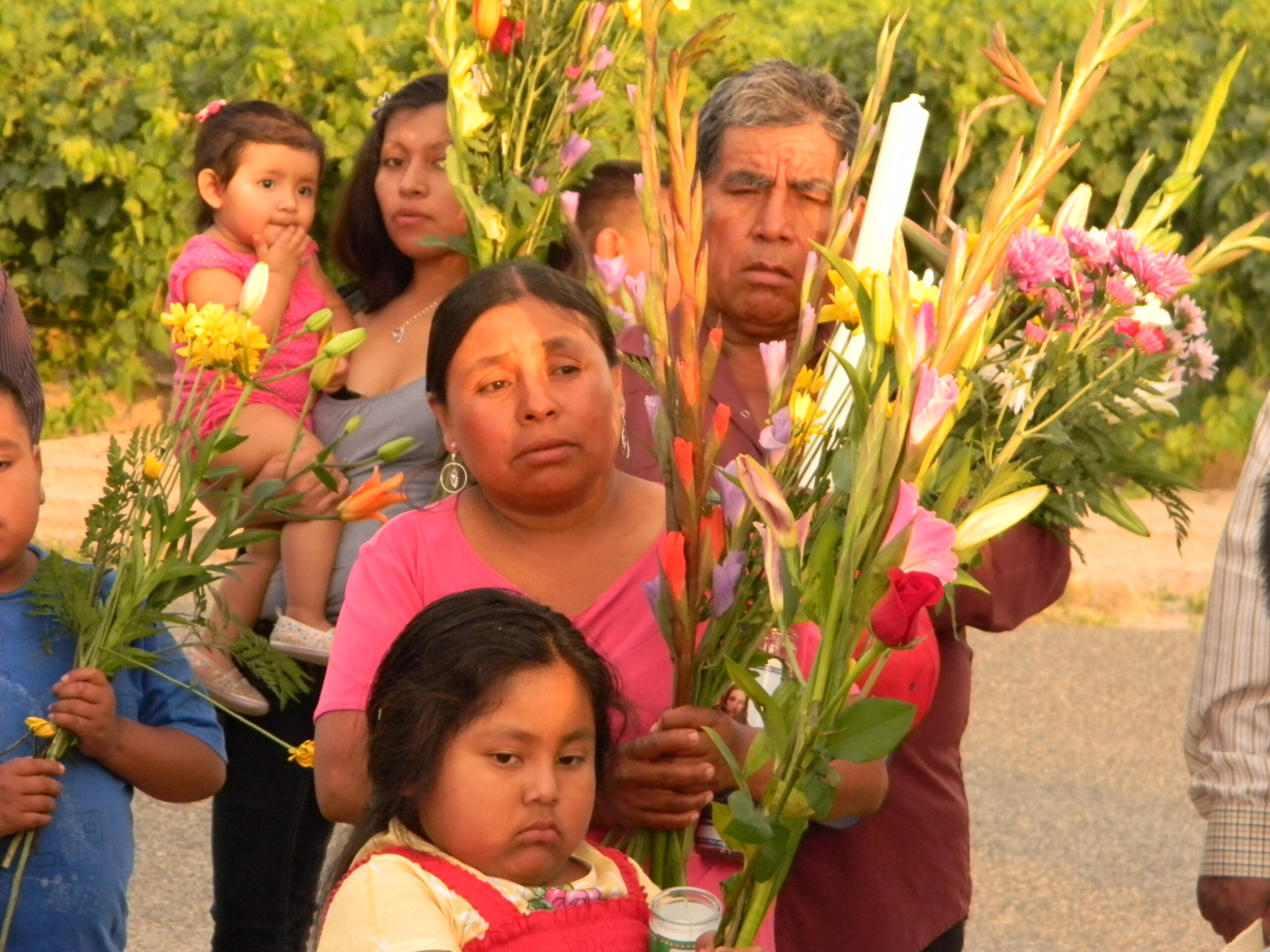Migrant Faith, Chapter One
Chapter One: Discovering the Faith of Migrant Workers
When considering the campesino, the migrant, the immigrant, the undocumented, the illegal, the foreigner, we need to remember these words that Jesus said: “As often as you did it for one of my least brothers, you did it for me” (Mt 25:40). In the parable of the final judgment Jesus identifies himself with the poor and the outcast. In over twenty years working in Hispanic ministry, the faith of Latin American migrants and immigrants has dramatically touched my life. My ideas and my passion for migrant ministry have been formed principally by a North of the Border experience in a variety of apostolic endeavors.
In January 2007, I had the opportunity to take a sabbatical. My Provincial superior told me to “rest, play a little golf and don’t work for six months.” This sounds like the easiest act of obedience I will ever be asked to do. I immediately left for a five-week tour of Mexico. I did not worry about housing because people often say, “Padre, tienes tu pobre casa en México…” (Father, you have a humble home in Mexico…). I love to tell people that I took the vow of poverty and became the richest person on earth because I truly have more homes than anyone I know. I went to visit my homes in Mexico in ten different communities from the beaches of Puerto Vallarta, to villages in Jalisco, Michoacán, Guerrero, Durango and Coahuila, to Mexico City and Cuernavaca. I stayed in homes receiving the hundred-fold promised by Christ to his disciples.
I listened to people’s hopes and dreams, to their stories of crossing into the United States, and to their heartache at being separated from loved ones by the experience of migration. I went to Mexico hoping to challenge, modify, and deepen my ideas about immigration.
I traveled Mexico by bus to let the reality of the other side of the border touch me. I enjoyed walking Mexican beaches for the first time in my life, participating in the pageantry of a religious feast at one of Mexico’s shrines (Nuestra Señora del Rosario in Talpa de Allende, Jalisco), living in rural towns deeply impacted by migration to the North, and listening to people tell their stories of crossing and working in el Norte (the United States).
Upon returning to the U.S. and sharing the stories of people whom I met, many have said, “I hope you write about your sabbatical experience.” The stories that I tell are not verbatim interviews; they are told through the ears of the listener rather than from the mouth of the speaker. I warn the reader that my translations of what people told me are the interpretations of a priest from the North. Still, I hope that my interpretations convey light and understanding on the complex realities of migration and ministry to the migrant. Many people, mostly Hispanic, but some non-Hispanic Americans and immigrants, have informed and formed my understanding of seeing Christ in the “least of my brothers and sisters”.
There are many scholarly theological and sociological studies of Latino faith and spirituality. Such scholarly treatises can be found in Latino studies programs at the Mexican American Catholic College in San Antonio, the University of Notre Dame, Boston College and many institutes and universities. My study of the faith of migrants was a journey of experience rather than a scholarly endeavor. My concern was directly pastoral in asking the migrant farm workers about the experience of the Church in their faith journey. I have witnessed the struggles of migrant workers to survive and thrive in the United States. I have worked in youth and parish ministry, preached parish missions, and addressed issues of justice and peace with migrants. I have celebrated wonderful moments of joy and hope with people, have heard the hardships of separation from families and have witnessed terrible abuses and tragedies in the lives of migrants.
My concern is pastoral care, bringing the grace of Christ to the migrant worker through the ministry of the Catholic Church. The Church has an important role to play in letting Christ touch the lives of migrants. The Church needs to work for justice for the immigrant by advocating for just and moral immigration laws and by protecting immigrants through health care, education and social services. The Church works in advocacy for the rights of workers, for their economic interests and for their safety. And the Church works to bring all peoples together that we may be one in Christ. All these ministries care for the migrants’ social wellbeing, but how do we nurture their faith and let the grace of Christ touch their lives?
My first experiences in the life of the migrant farm workers
I spent four weeks during the summer of 1998 with migrant farm workers in The Dalles, Oregon during the cherry harvest. Lovina Pammit and Israel Martinez, two lay missionaries, accompanied me. Each evening we celebrated Mass in different orchards. Before each Mass, I would hear confessions while the lay missionaries prepared the community for the Mass. During the Mass, Lovina and Israel took the children for liturgy of the Word and I spoke with the adults. They would bring the children back for the Liturgy of the Eucharist. After the Mass, we visited with the migrants and learned about their lives.
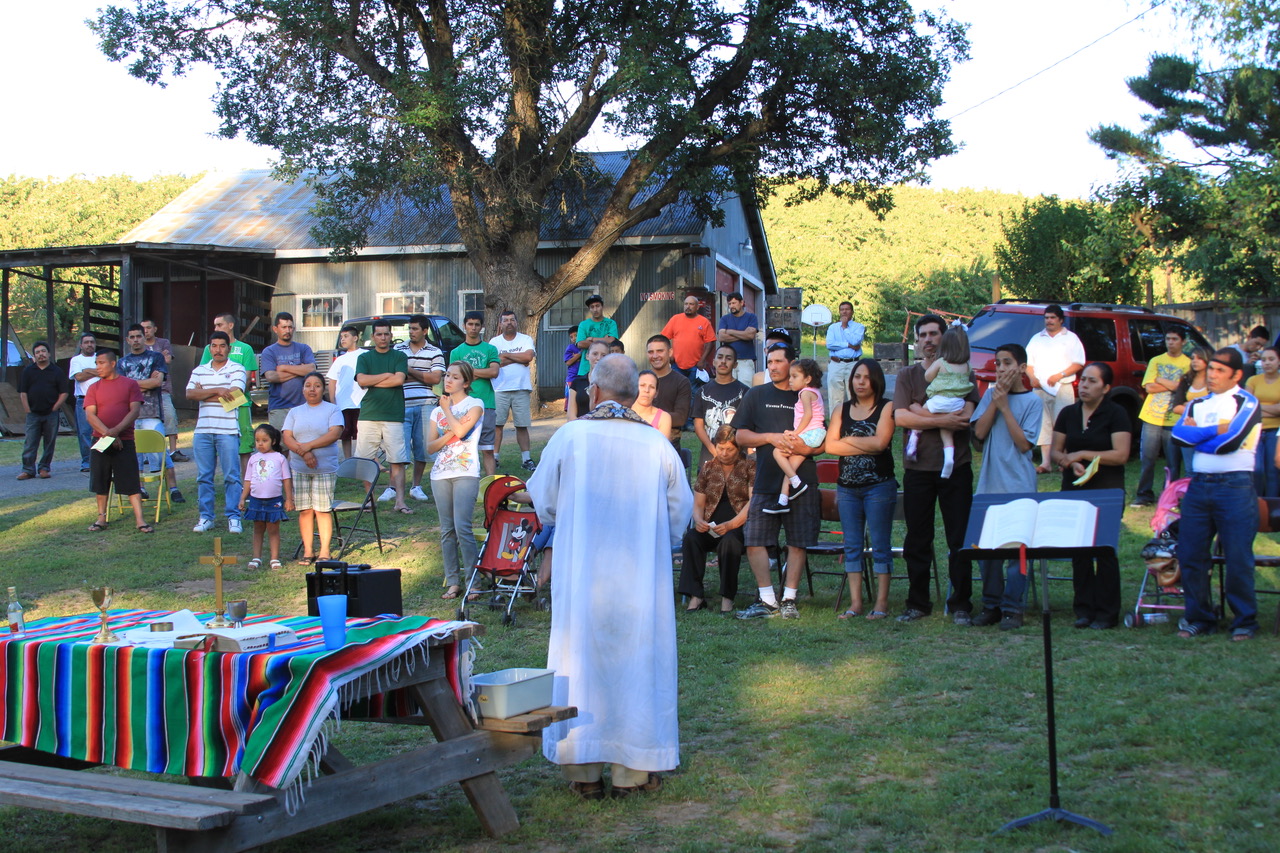
Mass for migrant farm workers during the cherry harvest in The Dalles, Oregon.
On several occasions, I asked people what they needed from the Church. A few spoke of the need for advocacy on the issues mentioned above, but over and over people asked for reassurance of God’s presence and love in their lives. They asked for prayer, religious instruction and for someone to listen to their pain over their separation from their families. Many asked for the grace of the sacraments of Baptism, Confirmation, and Eucharist for their children. One woman said, “Father, we do not need you to be our lawyer or social worker; we need you to be our priest.”
Israel Martinez observed that while many people attended our Masses, very few received Communion. He began to ask them why and found that many had never received their First Eucharist. Many of the young people said that they were Catholic but had never been taught the basic teachings of the Church. When we asked why, parents and young people gave us a glimpse into their experience of the Catholic Church in the United States. Many said that they had asked parishes in California where they lived about preparing their children for First Communion. Often, they were told that classes begin in September and end in May. Some lived in communities that had programs that lasted two or more years. One parish that had several thousand Mexican families had placed a limit that only 100 children per year could take part in the First Communion program. Many children were placed on waiting lists. For many migrant workers it was simply not possible for their children to attend such programs as they worked the fields and followed harvests. Many children were baptized, but few received their First Communion.
That summer my relationship with migrant farm workers began. One of the highlights of the summer took place during the second week of the harvest. I celebrated my 25th anniversary as a priest. One of the crews took a day off and prepared a fiesta. The men prepared birria and carnitas, while the women prepared the beans, rice and salsa. It was a Sunday and after the 6:00 p.m. Mass, nearly 300 migrant workers came to the fiesta. A group of troubadours went around singing at each table for entertainment. There is no better way for a missionary to celebrate his anniversary.
After two summers of celebrating Masses in migrant camps, I presented a plan for a program of preparation for First Eucharist to the pastor of St. Peter’s Church and to the Bishop of Bend, Oregon. That program, The Cherry Harvest Mission, was so successful that it completed its thirteenth summer in 2010. Over those years there were 900 First Communions, over 400 Confirmations, 160 Baptisms and six marriages. The mission allowed me the privilege of gaining a unique entry into the world of the migrant farm worker.
Capítulo Uno: Descubriendo la fe de los trabajadores migrantes
Al considerar al campesino, al migrante, al inmigrante, al indocumentado, al ilegal, al forastero, necesitamos recordar estas palabras que dijo Jesús: “Cuando lo hicieron con alguno de los más pequeños de estos mis hermanos, me lo hicieron a mi” (Mt. 25,40). En la parábola del juicio final, Jesús se identifica con el pobre y el marginado. Por más de veinte años que llevo trabajando en el ministerio hispano, me ha conmovido la fe de los migrantes e inmigrantes latinoamericanos. Mis ideas y mi pasión por el ministerio migrante se han formado principalmente por mi experiencia en una variedad de actividades apostólicas al norte de la frontera.
En enero del 2007, tuve la oportunidad de tomar un año sabático. Mi Superior Provincial me dijo: “Descansa, juega un poco de golf y no trabajes por seis meses”. Esto suena como el acto más fácil de obediencia que jamás me pedirán. De inmediato salí para hacer un recorrido de cinco semanas a México. No me preocupaba por la vivienda porque la gente seguido me decía, “Padre, tiene su pobre casa en México…” Me encanta decirle a la gente que al hacer mi voto de pobreza me convertí en la persona más rica del mundo porque verdaderamente tengo más casas que todas las personas que conozco. Fui a visitar mis casas en México en diez distintas comunidades desde las playas de Puerto Vallarta a los pueblitos en Jalisco, Michoacán, Guerrero, Durango y Coahuila, hasta Cuernavaca y la Ciudad de México. Me quedé en casas recibiendo en abundancia lo que Cristo prometió a sus discípulos.
Escuché las esperanzas y sueños del pueblo, sus historias al cruzar a los Estados Unidos y su dolor al ser separados de sus seres queridos por la experiencia de la migración. Fui a México con la esperanza de retar, modificar, y profundizar mis ideas sobre la inmigración.
Viajé en México por autobús para sentir la realidad del otro lado de la frontera. Por primera vez en mi vida disfruté caminar en las playas mexicanas, participé en una fiesta religiosa en uno de los santuarios de México (Nuestra Señora del Rosario en Talpa de Allende, Jalisco), viví en pueblos rurales profundamente impactados por la migración hacia el norte y escuché a la gente contar sus historias de cruzar y trabajar en “el Norte”.
Al regresar a los Estados Unidos y contar las historias de las personas a quienes conocí, muchos me dijeron: “Espero que escriba sobre su experiencia de su año sabático”. Las historias que cuento no son entrevistas palabra por palabra, sino que son historias del oído del oyente más que de la boca del cuentista. Aviso al lector que mis traducciones de lo que la gente me dijo son las interpretaciones de un sacerdote del norte. Aún así, espero que mis interpretaciones den luz y entendimiento a las realidades complejas de la migración y el ministerio al migrante. Mucha gente, mayormente hispana, pero algunos americanos e inmigrantes, han informado y formado mi entendimiento de ver a Cristo en “el más pequeño de mis hermanos y hermanas”.
Hay muchos estudios teológicos y sociológicos de la fe y de la espiritualidad Latina. Tales estudios académicos se encuentran en programas de estudios latinos en el Colegio Católico México Americano en San Antonio, en la Universidad de Norte Dame, en La Universidad de Boston College y en muchos institutos y universidades. Mi estudio sobre la fe de los migrantes fue una jornada de experiencia más que un estudio académico. Mi interés fue directamente pastoral al preguntarles a los trabajadores migrantes sobre la experiencia de la Iglesia en su jornada de fe. He visto las luchas de los trabajadores migrantes para sobrevivir y prosperar en los Estados Unidos. He trabajado en el ministerio juvenil y en el ministerio parroquial. Además, he predicado en misiones parroquiales y en asuntos de justicia y paz con migrantes. He celebrado maravillosos momentos de alegría y esperanza con la gente, he oído de las dificultades que contrae la separación de las familias y he visto terribles abusos y tragedias en las vidas de los migrantes.
Mi interés es el cuidado pastoral, llevar la gracia de Cristo al trabajador migrante a través del ministerio de la Iglesia Católica. Una función importante de la Iglesia es permitir que Cristo toque la vida de los migrantes. La Iglesia necesita trabajar por la justicia del inmigrante, abogar por leyes morales y justas de inmigración y proteger a los inmigrantes por medio de cuidado de salud, educación y servicios sociales. La Iglesia trabaja para abogar por los derechos de los trabajadores, sus intereses económicos y su seguridad en el trabajo. Y la Iglesia trabaja para reunir a todo el pueblo para ser uno en Cristo. Todos estos ministerios están al pendiente del bienestar social del migrante, pero ¿cómo nutrimos su fe y dejamos que la gracia de Cristo toque sus vidas?
Mis primeras experiencias en la vida del campesino migrante
Durante el verano de 1998, pasé cuatro semanas con campesinos migrantes en The Dalles, Oregón durante la cosecha de la cereza. Lovina Pammit e Israel Martínez, dos misioneros laicos, me acompañaron. Cada noche celebramos misa en diferentes huertas. Antes de cada misa, yo escuchaba confesiones mientras que los misioneros laicos preparaban a la comunidad para la misa. Durante la misa, Lovina e Israel llevaban a los niños para escuchar la liturgia de la palabra y yo hablaba con los adultos. Lovina e Israel regresaban a los niños para la liturgia de la Eucaristía. Después de la misa, platicábamos con los migrantes y aprendíamos acerca de sus vidas.
En varias ocasiones pregunté a la gente qué necesitaba de la Iglesia. Algunos hablaban de la necesidad de abogar por las preocupaciones mencionadas anteriormente, pero una y otra vez la gente pedía que se les reiterara de la presencia y amor de Dios en sus vidas. Pedían oración, instrucción religiosa y atención a su dolor sobre la separación de sus familias. Muchos pedían la gracia de los sacramentos del Bautismo, la Confirmación y la Primera Comunión para sus hijos. Una señora me dijo: “Padre, no necesitamos que usted sea nuestro abogado o trabajador social. Necesitamos que usted sea nuestro sacerdote”.
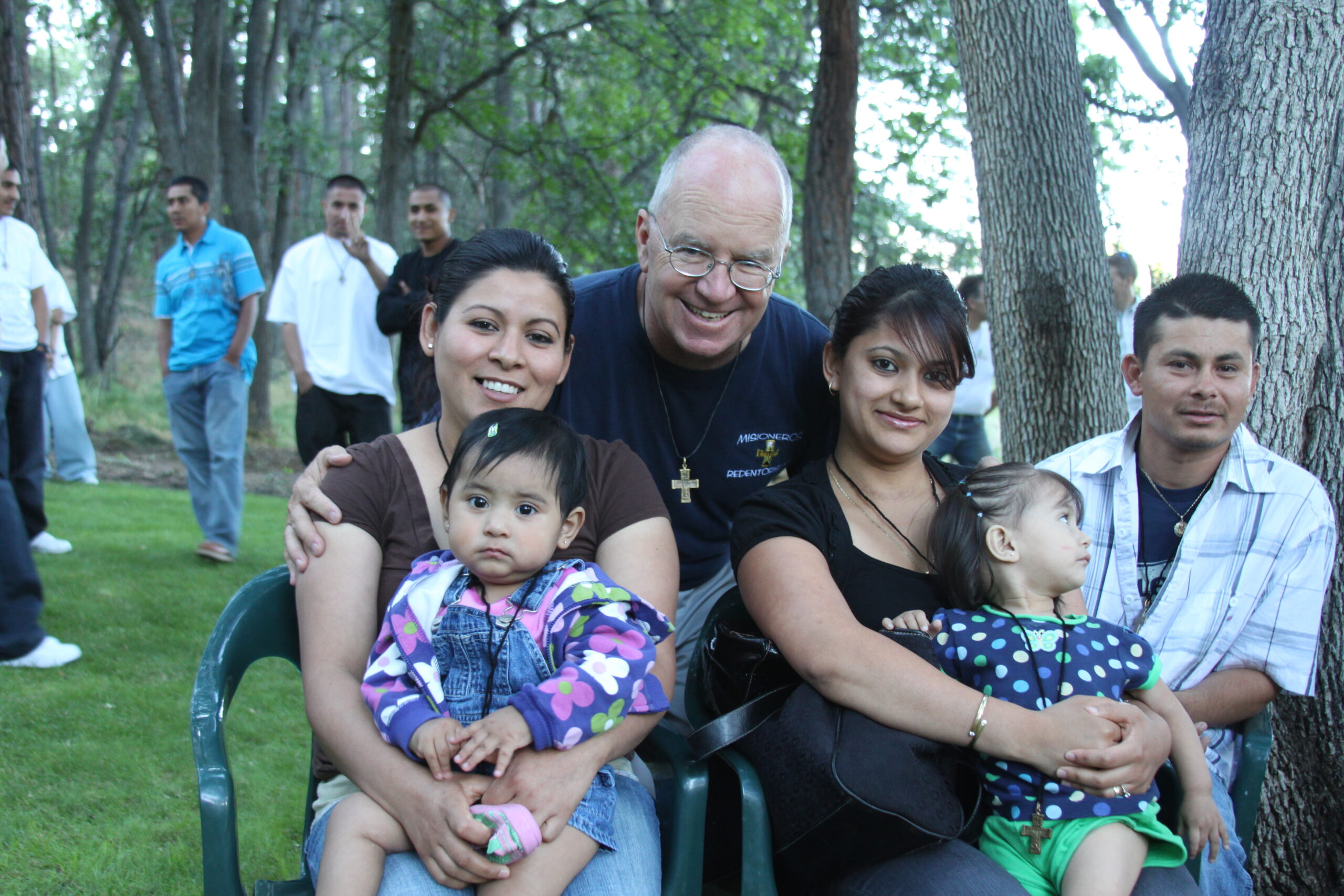
Después de una Misa para los campesinos migrantes durante la cosecha de la cereza en The Dalles, Oregón.
Israel Martínez observó que mientras mucha gente asistía a nuestras misas, muy pocos recibían la comunión. Empezó a preguntar y se dio cuenta de que muchos nunca habían recibido su Primera Comunión. Muchos de los jóvenes decían ser católicos, pero nunca se les había instruido en las enseñanzas básicas de la Iglesia. Cuando preguntamos, los padres y jóvenes nos dieron un vistazo sobre sus experiencias con la Iglesia Católica en los Estados Unidos. Muchos dijeron que en las parroquias en California donde vivían, habían preguntado sobre la preparación de sus hijos para la Primera Comunión. Seguido les decían que las clases empezaban en septiembre y terminaban en mayo. Algunos vivían en comunidades que tenían programas que duraban dos años o más. Una parroquia que contaba con miles de familias mexicanas había puesto un limite indicando que, por año, solo 100 niños podían participar en el programa de Primera Comunión. Muchos niños terminaban en lista de espera. Para muchos trabajadores migrantes, simplemente no era posible que sus hijos asistieran a tales programas porque trabajaban en el campo y seguían la cosecha. Muchos niños eran bautizados, pero pocos recibían su Primera Comunión.
Ese verano empezó mi relación con los campesinos migrantes. Un evento sobresaliente del verano tomó lugar durante la segunda semana de la cosecha. Celebré mi vigésimo quinto aniversario como sacerdote. Los trabajadores de una huerta tomaron el día libre y me prepararon una fiesta. Los hombres prepararon birria y carnitas, mientras que las mujeres prepararon los frijoles, arroz y salsa. Fue un domingo y después de la misa de las seis de la tarde, cerca de 300 trabajadores migrantes acudieron a la fiesta. Un grupo de trovadores iba de mesa en mesa cantando para entretenernos. No hay mejor modo para que un misionero celebre su aniversario.
Después de dos veranos predicando misas en campos migrantes, presenté un plan para un programa de preparación para la Primera Comunión al pastor de la Iglesia de San Pedro y al Obispo de Bend, Oregón. Ese programa, la misión de la cosecha de cereza en The Dalles, Oregón, completó su décimo tercer verano en el 2010. A través de esos años hubo 900 Primeras Comuniones, más de 400 Confirmaciones, 160 Bautismos y seis Matrimonios. La misión me concedió el privilegio de entrar al mundo del campesino migrante.
